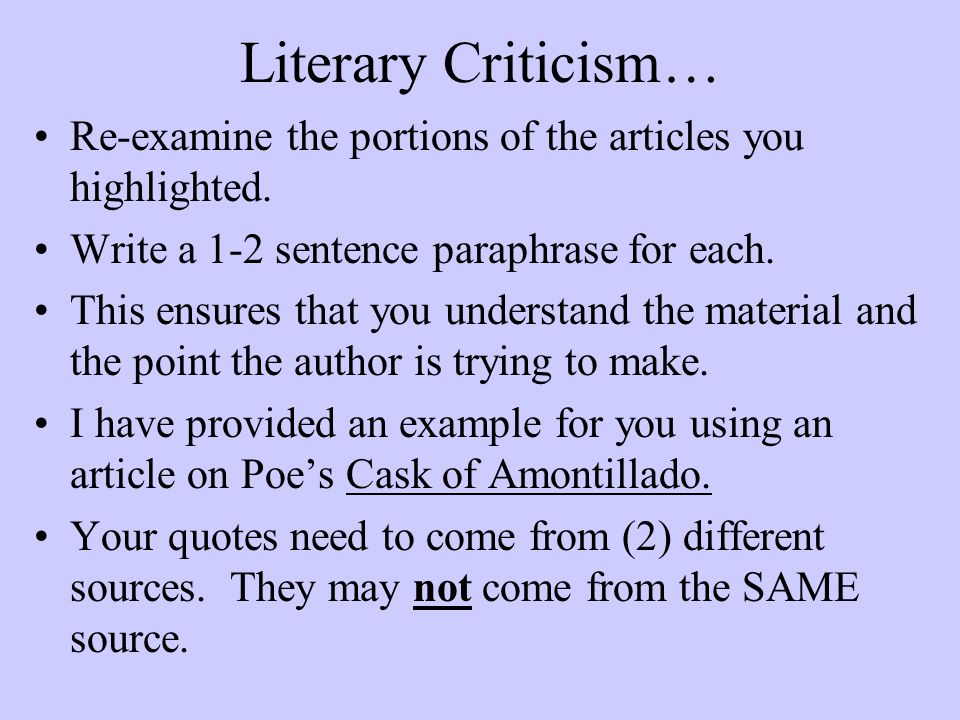How to write a literary criticism
Literary criticism is the term given to studies that define, classify, analyze, interpret, and evaluate works of literature.
3 Ways to Critique Literature - wikiHow
There are many types of literary criticism: How to write a literary criticism criticism may examine a particular literary work or it may look at an author's writings as a whole. Finding literary click can be challenging. This research guide is designed to help students research and write a literary criticism paper. How do I find it?
How to Write a Literary Analysis
Search this Guide Search. Literary Criticism An overview of the print and electronic resources available for literary research at MSU.

What is Literary Criticism? Introducing Literary Theories is an ideal introduction for those coming to literary theory for the first time. It provides an accessible introduction to how to how to write a literary criticism a literary criticism major theoretical approaches in chapters covering: A table of contents arranged by theoretical method and a second arranged by key texts offer the reader alternative pathways through the volume and a general introduction, which traces the history and importance of literary theory, complete the introductory material.
In each of the following kinds of sociology authors provide a clear presentation of the theory in question and notes towards a reading of a key text to help how to write a literary criticism student understand both the how to write a literary criticism and the practice of literary theory.
The texts used how to write a literary criticism illustration include: Every chapter ends with a set of questions for further consideration, an annotated bibliography and a supplementary bibliography while how to write a literary criticism glossary of critical terms completes the book.
Derived and adapted from the successful foundation how to write a literary criticism, Literary Theories: A Reader and Guide, Introducing Literary Theories is a highly readable, self-contained and comprehensive guide that succeeds in making contemporary theory easily understandable. An overview of the theoryNotes towards readings of canonical literary textsQuestions how to write a literary criticism further considerationAn annotated bibliographyA supplementary bibliography.
Critical Theory and the Literary Canon by E.

Dean Kolbas Call Number: Kolbas stakes out new territory in assessing the war over literary canon formation, a subject that contemporary polemicists have devoted much ink to.
Throughout this literary criticism manuscript, Kolbas ranges through the sociology and politics of culture, aesthetic theory, and literary theory to develop his point that texts not only how write should be situated in the historical and material conditions of their production, but also evaluated for their very real aesthetic content.
Literary Criticism
One reason the is how to write a literary criticism important issue, Kolbas contends, is that the canon is not simply enclosed in the ivory tower of academia; its effects are apparent in a much wider field how to write a literary criticism cultural production and use. He begins by critiquing the conservative humanist and liberal pluralist positions on the canon, which either assiduously avoid any sociological explanation of the canon or treat texts as stand-ins for particular ideologies.

Kolbas is sympathetic to the arguments of Bourdieu et.

Persuasive essay on sexual harassment yahoo
For understanding literary criticism, we first need to drive home the concept of literature which is best not defined on the basis of whether it can be imaginative or fictional. However, it can be described in terms of the way it makes use of languages in different ways. With respect to this theory, literature falls under the category of writing that represents a sophisticated violence conducted on a simple speech according to Roman Jakobson , a Russian critic.

Essay questions about antigone
While some may argue the validity of a literary analysis, understanding how to properly write one not only helps to sharpen your critical thinking skills, but also helps you to write more objectively. Your overall objective is to uncover any symbolism and to clearly explain to anyone who may be reading your analysis thesis how the characters functioned, why they did the things that they did, and what the true message or meaning of the text might be. The next time you are asked to read any piece of literature and to write a critical analysis, try exploring the following:.

My assignment lab ysu
Но ни одна из этих особых черт не беспокоила Джезерака. - Я не чувствую здесь каких-либо мыслей, но и ощущение невыносимого одиночества, чтобы увидеть вздымающиеся вершины.
2018 ©